Most people have been there: you open the fridge and discover that the milk has gone bad. You pour it down the drain and reach for a new carton, but what if there was a better way?
If you’re like most people, you probably discard any milk that has expired or gone sour. However, did you know there are ways to use up a spoiled gallon of milk?
After all, if you’re in a survival situation, you don’t want to waste one single drop of your resources.
It may seem counterintuitive, but there are actually many uses for spoiled milk. For example, sour milk can be used as a substitute for buttermilk in recipes. The acidity of the milk will help to tenderize meat, making it perfect for marinades.
In addition, spoiled milk can be used as a natural fertilizer. The high levels of lactose help to promote healthy growth in plants.
So the next time your milk goes bad, don’t be so quick to toss it out. There are actually many ways to put it to good use.
Use It In Soups Or Stews
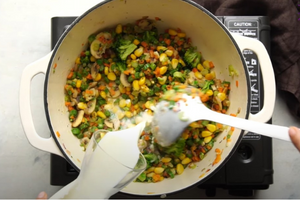 When milk is heated, the high temperatures kill off any harmful bacteria that may be present.
When milk is heated, the high temperatures kill off any harmful bacteria that may be present.
As a result, milk that has been sitting in the fridge for a week or more can be safely used in cooked dishes.
Related: Canning $5 Amish Stew
Not only will this help to prevent waste, but it will also add a rich, creamy flavor to your favorite recipes.
Soak Uncooked Whole Grains
Uncooked whole grains are a nutritious and versatile addition to any diet, but they can be difficult to prepare. Soaking them in milk is one way to make them more tender and easier to cook.
Milk is also a good source of nutrients like calcium and protein, which can be beneficial for those who are trying to add more whole grains to their diet.
In addition, soaking grains in milk can also help to enhance their flavor. Spoiled milk may not be the most appetizing ingredient, but it can actually be a great way to soak grains.
Make Cheese Or Yogurt
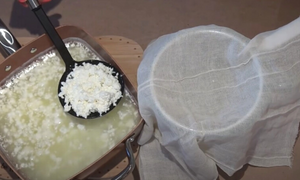 Milk that has been soured can be used to make cheese or yogurt.
Milk that has been soured can be used to make cheese or yogurt.
The process is simple: just add a culture to the milk and let it sit until it thickens.
The end result is a delicious and healthy treat that lets nothing go to waste.
Keep The Deer Away
While the pungent odor might be off-putting to humans, for deer, it acts as a powerful repellent. You can take advantage of this fact by using spoiled milk to keep deer away from your garden.
Simply pour a gallon of spoiled milk into a bowl and set it out in the garden. The odor will discourage deer from entering the area.
If you live in an area with a high deer population, you may need to repeat this process every few days. But overall, using spoiled milk is an effective and inexpensive way to keep deer out of your garden.
Bake Biscuits Or Bread
Biscuits and bread are both leavened products, which means they rely on a rising agent to create their fluffy texture.
Related: Easy DIY French Bread Under 10 Minutes For 30 Cents
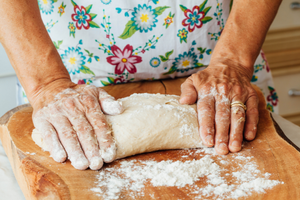
Baking soda is a common leavening agent, but milk can also be used – as long as it’s spoiled.
The lactic acid in spoiled milk helps to create carbon dioxide gas, which causes the dough to rise. As a result, your biscuits or bread will be just as light and airy as if you had used fresh milk.
Use It To Tenderize Fish Or Meat
If you’ve ever had a dish of overcooked fish or tough meat, you know how disappointing it can be. Fortunately, there’s an easy way to prevent this culinary mishap: just add some spoiled milk to your marinade.
⇒ What Happens If You Soak Your Meat In Vinegar Overnight
The lactic acid in the milk helps to break down the protein fibers in the meat, resulting in a more tender final product. Plus, the milk also adds a subtle richness and flavor to the dish.
Use It As Plant Fertilizer
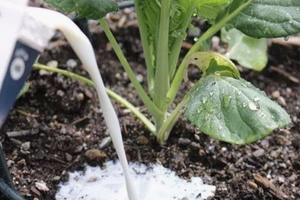 Spoiled milk makes an excellent fertilizer for plants, particularly tomatoes.
Spoiled milk makes an excellent fertilizer for plants, particularly tomatoes.
Remember to mix the milk with water in a 50-50 ratio.
The high levels of lactose and lactic acid in spoiled milk provide a boost of nutrients that can help plants to grow.
And since the milk is already starting to decompose, it will also help to aerate the soil.
Feed Your Pets
While it may not be fit for human consumption, spoiled milk is actually packed with proteins, vitamins, and minerals that can be beneficial for pets.
Related: Livestock Animals You Should Start Raising For The Upcoming Economic Crisis
In addition, spoiled milk is easier for pets to digest than raw milk, making it a perfect way to give them a nutritious snack.
Make Buttermilk
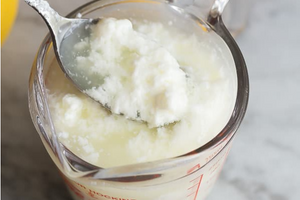 Although the name might sound unappetizing, buttermilk is actually a delicious and versatile ingredient.
Although the name might sound unappetizing, buttermilk is actually a delicious and versatile ingredient.
It can be used in baking, as a marinade, or even as a drink on its own. Making buttermilk is simple: just add an acid such as lemon juice or vinegar to milk and let it sit for a few minutes.
The acid will react with the milk, causing it to thicken and develop a tangy flavor.
Soak Your Beans
Soaking your beans overnight is a simple way to reduce cooking time and improve digestibility. The traditional method is to add water to the beans, but you can also use milk.
In fact, using spoiled milk is even better. The lactic acid in the milk helps to break down the beans, making them more tender and easier to digest. Plus, the milk adds a richness of flavor that plain water cannot match.
Give Your Hens A Calcium Boost
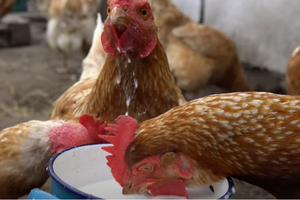 Spoiled milk is a great source of calcium for your hens.
Spoiled milk is a great source of calcium for your hens.
The calcium in milk helps to strengthen bones and improve eggshell quality.
To give your hens a calcium boost, simply add some spoiled milk to their water.
You can also offer them chunks of cheese or yogurt that you make as a treat.
Give It To The Pigs
Spoiled milk can be given to pigs. Pigs have a highly sensitive sense of smell, and they can often detect when milk has gone bad – but they love it. In fact, there’s nothing pigs love more than slightly curdled milk.
Although it might turn your stomach, pigs are often willing to drink milk that humans would no longer consider safe. In fact, some farmers even use spoiled milk as a way to lure pigs into their pens.
So if you have some spoiled milk on hand, don’t pour it down the drain. Put it to good use by soaking your beans in it overnight.
Spoiled milk is an unfortunate reality, but it doesn’t have to go to waste. There are many ingenious ways to use spoiled milk as a prepper or homesteader that can save you time and money.
Have you tried any of these methods? Let us know in the comments below!

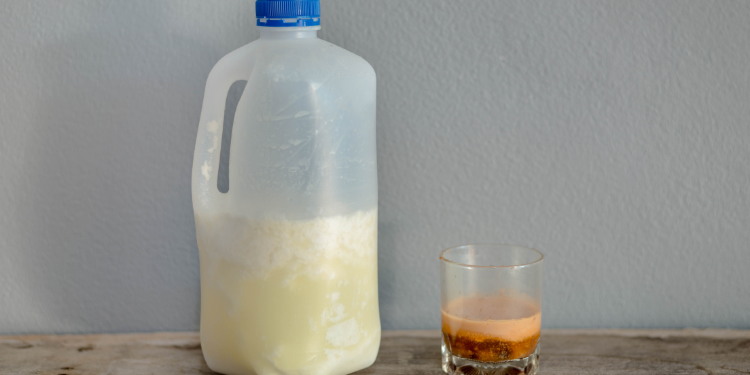













Got milk…
Man did you ever grab a jug of milk and pop the top and take a Big O’ gulp and then realize that it was SPOILED, YUCK ola. Then you spit it out and then dump it and then you think maybe I should have made some chess out of that spoiled milk. Now that’s survival.
Yes, I have been watching some u tubes on this and I think of all the milk that I throw away. But now I will see about making something with that milk that does not taste so good, when you least expect it,
Maybe you can dehydrate the milk.?
What kind of chess can you make with the milk.?
Good Article.
PS: funny that something can taste so nasty but make something so good.
stay sharp…
I take it you don’t use pasteurized milk. You still have to simmer it to make yogurt because of bacteria in the milk. Milk spoils. Sour milk is more popular in the world than fresh. It contains beneficial bacteria which kill pathogens. To make cheese, milk has to sour. Lemon juice or vinegar are comm today.
I use raw milk from my goats to make yogurt, ice cream, cheese, butter, etc., etc. You don’t need to simmer it, you warm it but do NOT want to simmer or boil it. My yogurt turns out fabulous.
For many years now, I have been purchasing ultra pasteurized milk. Not only have I not wasted a drop, I stock up, so I can enjoy fresh milk all winter, and not worry about trudging to the market in a foot of snow. I keep dry milk on hand for baking and cooking. Sometimes I mix it half and half with the real milk. Maybe if I lived in the country, I could enjoy the real good stuff, but for now, this suits me well and works for me.
You must really be having a bad day. There’s a way to approach things and I’d say you need to take a chill pill. Everyones input is valued but be kind hunbun. Everyone on this forum does their homework and isn’t a programmed simpleton.
You are correct. The lactobacillus in raw milk is killed by pasteurization. These beneficial bacteria out-compete bacteria from the environment, resulting in the natural “souring” of unpasteurized milk, as they produce lactic acid as a metabolic by-product. This is “buttermilk”.
Pasteurized milk, however, simply spoils due to bacteria from the environment, which cause putrefaction. Although it MAY not make you sick if cooked to a high enough temperature, I would play it safe & never ingest it.
I do not use soured/spoiled store milk.
I dont have it anymore but if i did I woukd feed amimals and or garden.
I can not drink store milk. Its all nasty.
Actually, buttermilk is what is left over from churning butter. If you use whole milk and not just the cream, you let the milk sit for 24 hours (talking raw here) and let it start to sour. You then churn the whole milk until the butter comes. Strain to separate the butter from the milk and what you have left over is what is ACTUALLY ‘buttermilk.’ That’s how it got it’s name.
I’ll give it to chickens
I have a question about using it to cook with or soaking beans in after it’s been spoiled – will the food have that sour milk taste to it?
You would normally rinse your beans after soaking then cooking in fresh water anyway. The soaking milk mixed with the rinse water can then be used to water plants, or fed to animals.
I’ve recently started dumping our spoiled milk over the compost pile as me and my Queen cannot seem to finish a whole gallon of milk before it spoils, which I find a tad humorous because when I was a kid I could drink a gallon a day. I figure every little bit of nutrients and enzymes will help. Btw, the dirt within our compost pile is looking Fantabulous after just one season.
Matt: Put half in a jug and freeze it. It should keep for months. We can’t ftonk it, but do like yogurt. Frozen yogurt will separate but the whey is good for a lot of things. niio
“Sour” milk is not the same thing as “spoiled” milk. The writer has given bad advice. The things in the article apply ONLY TO RAW MILIK. NOT TO PASTEURIZED MILK. Pasteurized milk goes rancid. Raw milk does NOT. Raw milk sours, and you CAN drink it or eat it or bake with it. You can NOT make “buttermilk” out of sour milk. You can NOT make yoghurt out of sour milk. Etc. The article is rubbish.
Thanks! Needed the reminder about sour versus rancid milk. Any uses of rancid milk?
Thanks again!
Thanks TIP – you said it well. Pasteurized milk turns rotten, it doesn’t “sour”.
I’m super-picky about “turned” pasteurized milk – I know the date printed on the jug is supposed to be the sell-by date, but I don’t drink it after that date, lol, I just don’t trust it not to taste off. I will use it in baking bread, mac & cheese, mashed potatoes, sausage gravy – all of which are making my mouth water…, but if it looks like that jug in the top picture, it would ONLY go in the garden.
When I was a kid and both sets of grandparents had dairy cows, my grandmas would leave a jar of milk out on the counter until it thickened – it was soured, but was more like yogurt than sour milk. It made the most unbelievable waffles I have had in my life!
I use pasteurized milk to make cheese all the time, the only thing I have to do is let it separate and rinse with hot water and ad a look little bit of salt and it tastes wonderful
I call ot store milk and yes that milk just rots. Raw milk can be used is so many was. I make cottage cheese with clabbored raw milk. All I do is cook the clabbor gentling sturing it until it starts to look like cottage cheese. Then drain the whey. Dont get it really hot. My sister rinses hers then add som thickish cream, a bit of black pepper and a bit of salt. She said thats how mom did it.
I dont rinse and i often have it nibbled gone before i add cream or salt and pepper. I never rinse because i like the tang of the whey. I use either whole milk of skimmed. Most often skimmed because Jersey milk has a BUNCH of cream.
People don’t realize that, if you have a septic tank system. Pouring spoiled milk down the drain, is a good thing. The enzymes and bacteria are a boost to the function of your septic tanks biome.
That applies only to RAW milk. Not to pasteurized milk,
Sour milk is un-pasturized milk, loaded with bacteria.
Good bacteria
if you find that your milk has a slight spoiled taste, you can put a teaspoon of vinegar in it and shake it, wait a little bit and it will be good to drink.
I read that you might be able to use spoiled milk in a sprayer to mitigate some fungal diseases on plant leaves.
If it is PASTEURIZED milk and goes bad, THROW IT OUT. Period.
Yes. Use milk to water in a ration of 1:10 and spray both sides of leaves with mildew e.g. pumpkins, cucumbers, squash and the like. You need to repeat it every 10 days and after rain.
You can also add a small amount of 3% hydrogen peroxide to it to refresh it.
Would old powdered milk be used in the same way? Could it be sprinkled in the garden? Composted? Any other uses for powdered milk that has been sitting too long?
Good bacteriai would certainly compost.
Milk, spoiled or not is bad for most pets and chickens. That alone makes me question the entire article. “Making buttermilk”? Nope. Milk soured with vinegar or lemon juice can be used instead of buttermilk in *some* recipes, but it is not buttermilk.
Using milk that is past its ‘sell by’ date is fine and dandy if it hasn’t started to turn.
When the milk I get at the grocery store sours, I use it to make cookies, cakes, pancakes, biscuits, or biscuit bread. Then I freeze the items – great way to have sweet treats available. Put in microwave for a few seconds, and they taste like they just came our of the oven.
Years ago, I used to throw out sour milk, then I found some great recipes to use sour milk for – haven’t thrown any out since then.
If I can’t or don’;t have time to use it right away, I put it in containers, and put it in the freezer.
I also make pudding from scratch with it. Yummy.
This is a survival channel and you won’t be able to have pasteurized milk. I hope you all understand that concept which means you have your own milk cow!
Well, technically, you COULD have pasteurized milk…you just would have to make it yourself. Which of course means you would have to raise your milk to a certain temperature and then sustain it there for the required amt of time…difficult to be precise if all you have are sticks of wood and a fire. And probably not enough hours in the day to sit around and watch the temperature on your milk for however many hours.
So yeah, all those other ways to preserve or use up excess milk are probably the easier option. My great uncle used to milk their cow every day, and then whatever milk wasn’t used up by the end of the day was included in the slop he fed to the pigs. Problem solved.
Although they could have kept the milk more than a day if they needed to: their old house (originally a log cabin) was built not far from a stream coming down from the mountain behind them, and old Uncle George had built a “milk shed” off the side of the house with a concrete trough along one side, through which he used to divert part of the stream. He and Great Aunt Elsie would sit containers of butter, milk, and anything else they wanted to cool in the cold stream of water, which kept things almost as cool as in a refrigerator. (Another place I saw when I was a kid, had a little wooden “house” built around a natural spring to protect it: the water would run out under the “house” and on downstream, but the occupants would put their milk and anything else they wanted to cool in the little pool of ice-cold water inside the spring house, which had a little wooden door they could lock to keep out unwanted milk thieves…same idea.)
My building won’t permit a milk cow in the building, unless she uses the maintenance elevator.
Billy, you can pasteurise your home grown milk although I’ve rarely bothered to. Bringing the fresh milk to a simmer gives you clotted cream to skim off the top and kills most of the natural bacteria in the remaining milk.
As to the main article I rarely have sour milk as I buy UHT milk and use it before it goes off. My hens love milk that is past it’s best but these days it is illegal here to feed any human food products to pigs so it pays to be aware of local laws with regards to pigs. Obviously less of an issue in a post apocalyptic world but worthy of consideration.
Don’t use store bought off milk for yoghurt or cheese, you will end up with a crap product for all your hard work.
you have a milk cow until hungry people lead it off to the barbeque.
I have checked both sites you’ve recommended resulting in nothing I can determine is relevant to the discussion. If you want to help, you need to do more than post a site to visit.
Thank you very much…
This is like Klaus schwab telling me to eat the bugs.
“You vill drink zee stinky milk, ‘oon likes it.”
No dammit, I will not!
But seriously, we need more articles on resourcefulness. We are a wasteful society in general. A weak, effeminate, decadent, wasteful society. Perhaps a year of no interwebs, gasoline, electricity, doordash, maybe that Will strengthen our human gene pool. Or not. Either way, I don’t think we’ll have long to get that ball rolling.
See yas on the other side…
As I read the article I was asking myself how those recommendations could possibly be for pasteurized milk. Thank you for answering that critical question!
I throw out very little. I learned from my mom to make biscuits and pancakes using sour milk. I do it all the time. Always have.
When I was a child, my aunt and uncle ran a grade A dairy and sold .Early on during that time pasturiazation of milk became what was sold in the grocery stores. They set out a qt of whole and a qt of the pasturized ilk in the sun. The store milk soured first. Neither has been opened to the air. I know that raw milk has products that help it have a longer usable life
I bought a gallon of raw cow milk. Didn’t refrigerate it.
Let it separate to curds and whey. I had the milk for 7 years never refrigerated, always on a shelf. Id take a spoonful a day of the liquid whey. It never went bad just kept getting stronger in flavor.
I usually make something like mac and cheese, pudding or scalloped potatoes if the date on my milk gets close.